Film Name: 妙先生 / Mr. Miao
Colourful House Pictures’ Chinese animation Mr. Miao was originally scheduled to be released on 31 December last year, but it seems that because of the poor word of mouth at the screening in December, the film decided to go back to the drawing board and remake it, and the film was temporarily withdrawn from the schedule……. So, this delay has dragged on for a whole seven months.
I have not seen the previous version of the film, and I do not know what changes have been made by the creators, so I will only use the latest release version to talk about my own views on Mr. Miao – the most important thing I would like to say is that it is a pity.
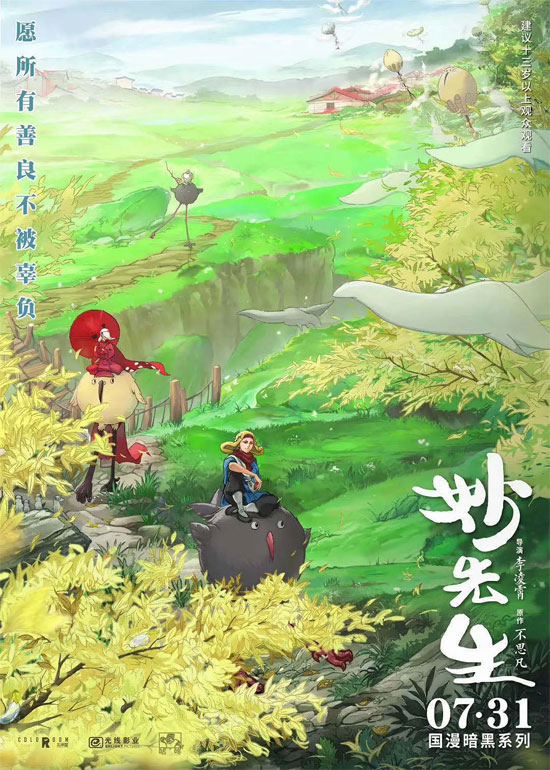
Mr. Miao has a good enough theme and a good enough concept to sell it, but it’s a far cry from that: the film’s eagerness to get its point across falls short in terms of narrative and pacing balance, making it dull and pale, and overshadowing even its otherwise excellent design and musings.
[Friendly reminder: there will be spoilers below].
Before we get to the shortcomings, let’s talk about Mr. Miao’s strengths.
Animation, as one of the most specialised forms of cinematic expression, has the advantage of being uninhibited and free-spirited, and Mr. Miao does indeed bring out the strengths of the “visual arts”, making no bones about showing off a bizarre and colourful world.
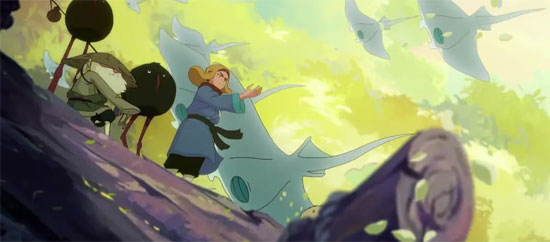
The film puts forward and captures the point that “this world is not the world of human beings”, and highlights the word “strange” in its settings, scenes and moods.
Mr. Miao’s varied, colourful and coherent style of painting, from the sadness of a decaying human village and town to the fantasy of a wandering spirit in the wilderness, as well as the gorgeous burning of a sea of red flowers and the ink and watercolour of a cave of a thousand Buddhas, are enough to confirm the film’s efforts in the aesthetics of the national style.
In the few action scenes, there are also some remarkable places, the combat style of each major character is very different, Ding Guo as a spiritualist, Yin Feng like an assassin, the “Duck Catchers” in the face before revealing their true colours, but also some of the flavour of the Zhuang and Harmony …… These styles are put together, greatly enriching the film’s aesthetic. These styles, when put together, greatly enrich the layered nature of Mr. Miao.
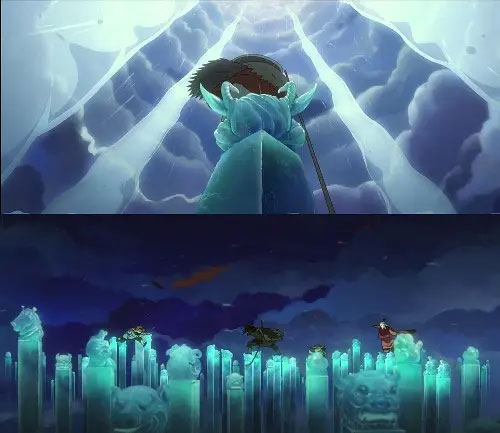
Of course, having said that, it doesn’t mean that the film is free of problems graphically.
In fact, there are quite a few obvious low-frame, coarse-grained scenes in the film, and some of the action sequences have no beginning and no end, coupled with the monotonous and incoherent subplots and other faults, the visual effects of Mr. Miao can hardly make an inch of progress on the basis of “looking pretty”, which has to be said to be a pity.
In terms of storytelling, which has been criticised by many, I have to be fair: although it doesn’t work well, the basic logic works, and it’s not too far-fetched – for example, the four good guys who choose to sacrifice their lives in the film, and their sacrifices are well-documented.
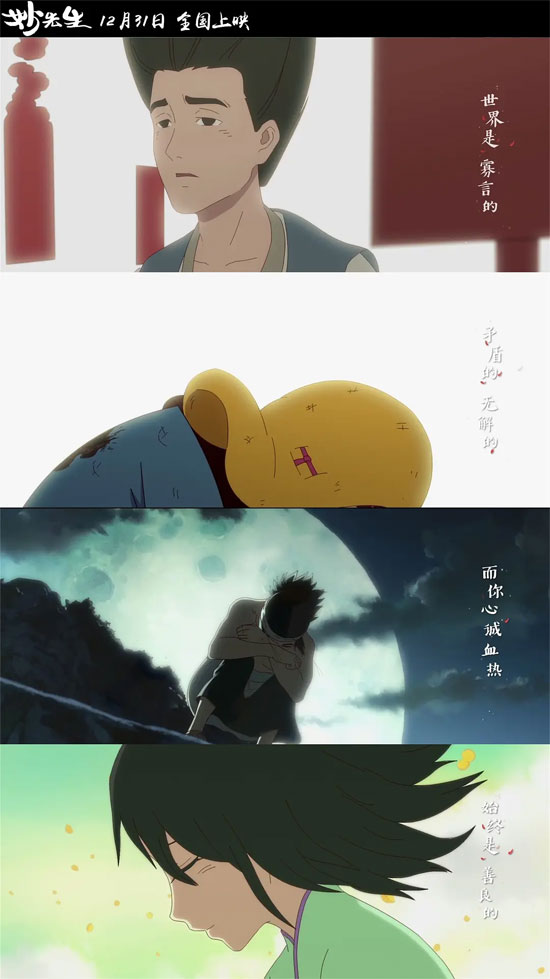
Xiaowen is willing to accept the “self-sacrifice of the adopted son”, not out of compliance with the traditional ethics of filial piety, but because he can not forget the closeness of childhood with his adoptive father; Yunxiang’s selfless sacrifice is not the so-called women’s morality, but because she loves the brother who was her only dependence; Xiao Dudu a person with dozens of orphans! It seems silly, but this gambler’s nanny is not silly anywhere else, “These days, how can you be good without learning something bad?” There is also Ding Guo, the original tracer who does not distinguish between good and evil, but eventually, he also sees through the world and chooses self-sacrifice.
Of all these “good guy” stories, I think Yun Xiang’s one stands out the most (as I’m sure many viewers do), and given the excellence of that chapter, it could stand on its own, and if it could serve as Mr. Miao’s only and biggest point of contention, the film would be a much better watch than it is.
It’s a rather poignant and sad traditional love story, with a sweet and poisonous bond forged by the protection and commitment of a young boy, as the saying goes, “Once you see a bamboo horse dance, you’ll be mistaken for life”.
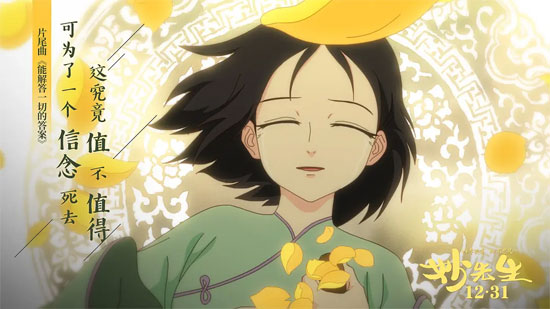
In addition to conforming to the audience’s traditional aesthetics in terms of the story’s intention, the film is also accompanied by a Suzhou commentary opera, “Qingmei Gone”, to aid the narrative, which is truly stunning, drawing in just a few brushstrokes the dependence and hopefulness of Yunxiang’s bonding, as well as the prolonged pain and self-delusion.
“Didn’t we agree that as long as I blow the whistle, you will come to me?” Yun-hyang’s poignancy and the red Pishion flowers she brings to the mountains at one point eclipses even the film’s main line ……
With that said, Mr. Miao’s biggest problem comes to light: the story is hollow, poorly rooted, and so intent on (overly) pursuing the point it wants to make that the film looks like a staged and pale sermon.
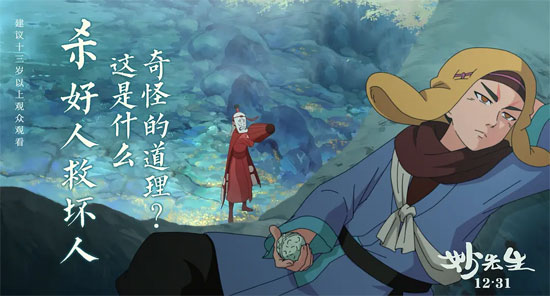
The first line of the first scene of the first act of the film is Dingo shouting at the inscrutable Mr Wonderful “Kill the good guys, save the bad guys, what kind of strange reasoning is that?!” Although the film directly throws out a core problem, enough to get to the point, but at the same time it also gives the film a very high tone, unless the next can hold the whole thing, or sooner or later broken.
It’s like singing at the top of your lungs and either repeating it or dropping it immediately – in this respect, Mr. Miao sets the wrong tone from the start, choosing to think at this level throughout the film, and those who can do so without breaking down are often masters who have been at it for many years… – “Mr. Miao” is clearly not a song that sings at the top of its voice the entire time, and it’s a wonder that it doesn’t get squirmy when it’s hard to tear through it.
The film’s setting is actually very good, the Golden Flower is only in the heart of the best of the good, but it will make the people around them fall, Ding Guo in the process of looking for the 12 Golden Flower, inherently contains all kinds of drama, especially between Ding Guo’s “goodness is a choice” and Yin Feng’s “choice is a kind of cruelty” conflict, which has a great deal of drama, especially between Ding Guo’s “goodness is a choice” and Yin Feng’s “choice is a kind of cruelty” conflict. The conflict between Ding Guo’s “Kindness is a choice” and Yin Feng’s “Choice is a cruelty” is highly watchable.
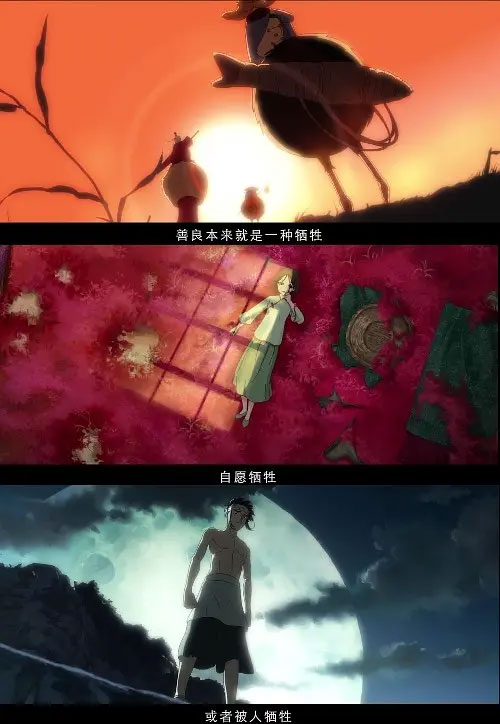
Normal storytelling is all about “slow and easy”, but Mr. Miao always seems to be too hasty. Take the conceptual battle between Ding Guo and Yin Feng as an example, the sense of antagonism has just been erected, and before it is embellished and deepened, it is too impatient to start talking about the reasoning of the big paragraphs, as if the theoretical outcome can be stated so that the previous process can be omitted. The process.
People grow up because of experiences, not because of sermons. This is why we like to read literature and art, why we like to read good stories, and this is also the reason why Mr. Miao is “not good” – such a fundamental problem is not the result of a sentence like “I’m crazy, it’s the most important thing”. “Nuts, I hate people like you who go around making speeches!” It’s easily dispelled.
I can’t help but think of Dahufa, which was also an adaptation of Bu Si Fan’s work back in 2017, with its dark and heavy subject matter, Eastern way of thinking, and even its stylistic temperament, which makes me think that Mr. Miao can be compared to Dahufa.
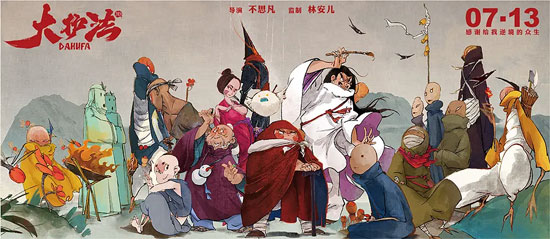
Many of the faults of Mr. Miao are also found in Dahufa, which is too much pretence and too many clichés, but the latter is much more balanced in terms of narrative pacing, and knows how to use laughs, aesthetics of violence, and metaphors to enhance the storytelling, and more crucially, even though there are a lot of non-human Peanuts in the film, it is telling a human story that the viewer can empathise with. More importantly, although the film is full of “Peanuts” who are not human, it is all about human stories that the audience can empathise with.
In contrast, although the characters in Mr. Miao are all human, they often don’t do or say anything, and the vicious circle of ice dandy jade – fire cicada moult – flowers on the other side of the shore is a mere formality, with the paranoid person who wants to “create a world where there are only good people” laughing at people and the soothsayer who wants to “die at the same time as you hear the truth” not having anything to do with it. The paranoid Laughing Man, who wants to “create a world where only good people live”, and the soothsayer Wusheng, who wants to “die at the same time as he learns the truth”, are all easy characters, but they are reduced to awkward tools under the lack of emotional flow of the book.
But then again, as lame as Mr. Miao’s reasoning is, the reasoning itself is thought-provoking, and it’s acceptable that Mr. Miao doesn’t show up from beginning to end (I interpret Mr. Miao as a balance of heavenly ways), and the film ultimately settles on the idea that “what’s missing isn’t faith, but goodness,” because “There are some things that are more meaningful than life and death”.
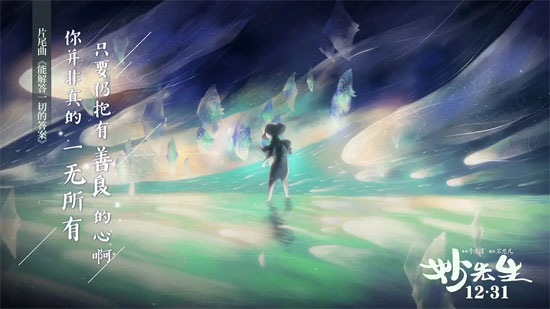
I appreciate the “no reason, only choice” attitude, but that’s about it. ……
I’m still willing to support “Mr. Miao” and recommend that you go to the cinema to see it, and I also hope that young creators will learn a lesson and not be over-ambitious, but rather polish their screenplays and tell a story that will reach the audience’s heart.
Please specify:Anime Phone Cases » Mr. Miao 2020 Film Review: First-rate concept, third-rate execution